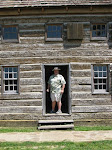 |
| Philip Glass in 2007 |
Philip Glass is quite probably the most well-known minimalist composer of our time. He was born in Baltimore and studied music at a very early age at the Peabody Conservatory of Music. At fifteen, he continued his musical training and studied mathematics and philosophy at the University of Chicago. Listeners cannot help but "count" in one way or another throughout all of his compositions. And his work is surely a Calculus in our own time, retaining its minimalist core wrapped in a stylistic evolution.
Here is an excerpt from his score for Koyaaniqatsi (1982), a mesmerizing audiovisual feast by Godfrey Reggio and Ron Fricke examining the interface of people, technology, and nature. Glass's score for this film has become a signature piece, one that he and his ensemble have performed around the world for three decades. Koyaaniqatsi - now a cult classic - was the first of three films that have become known as the Qatsi Trilogy. Readers who enjoyed the clip may want to investigate further.
Here is a man who writes music for the horror film, Candyman, the science fiction film, The Truman Show, and the psychological drama, The Hours. Here is a man who writes music for opera...
... a piano concerto about the Lewis and Clark expedition of 1804-06...
...and symphonies as well.
These are the days, my friends, and these are the days, my friends. Today is Philip Glass's 77th birthday.
... a piano concerto about the Lewis and Clark expedition of 1804-06...
...and symphonies as well.
These are the days, my friends, and these are the days, my friends. Today is Philip Glass's 77th birthday.
Photo credit: Axelboldt, WNYC New York Public Radio




















